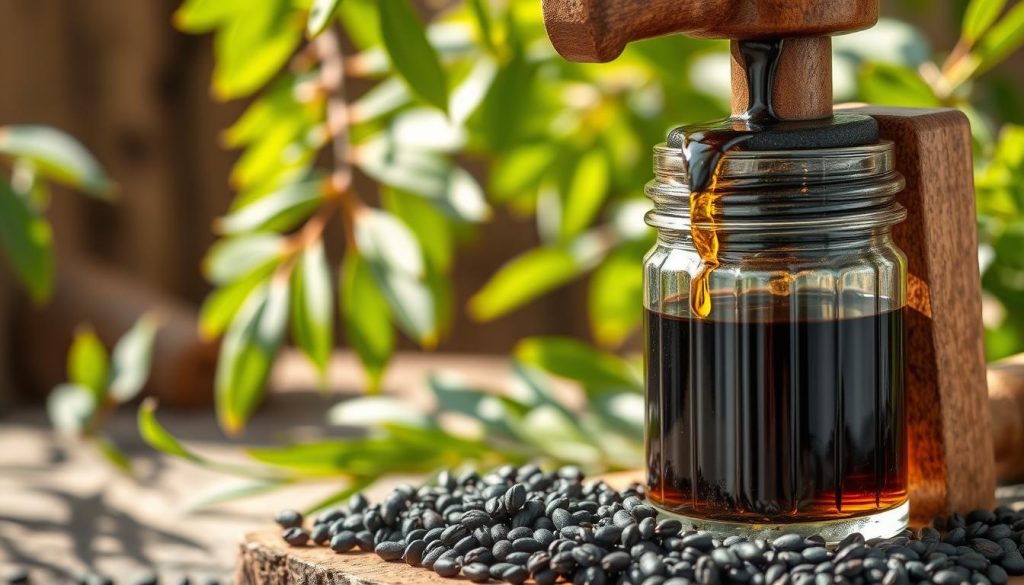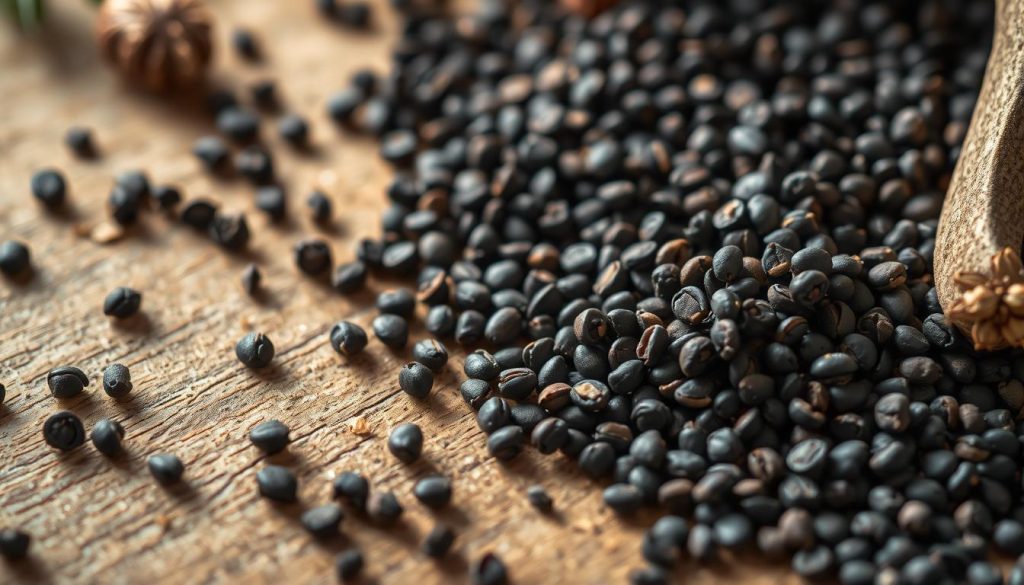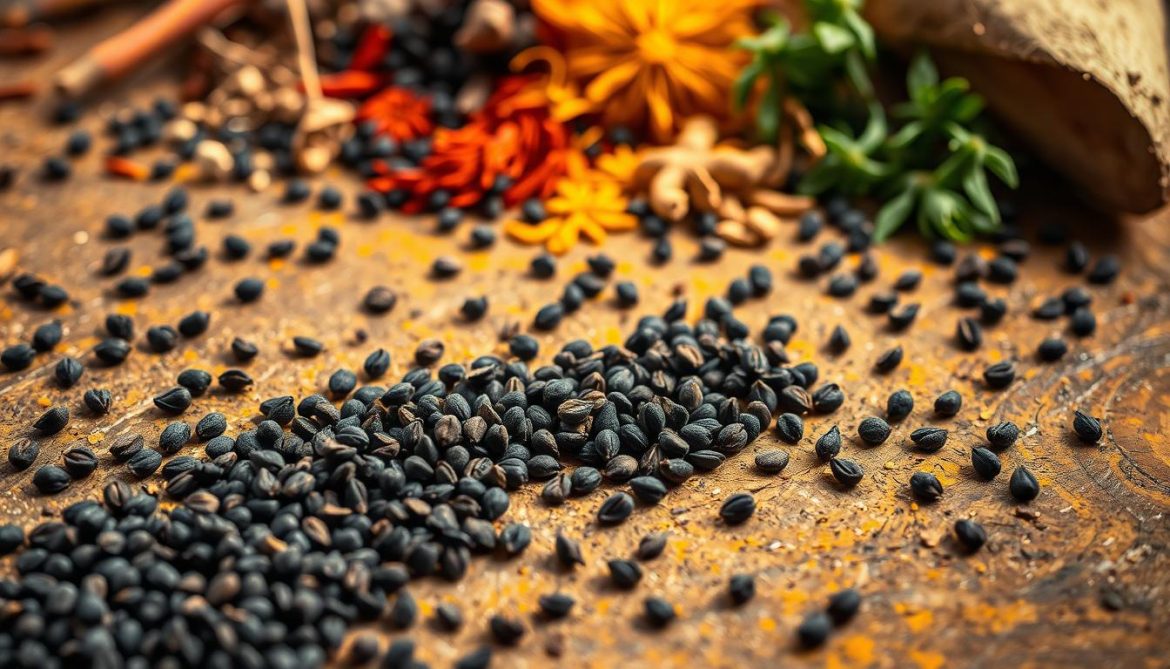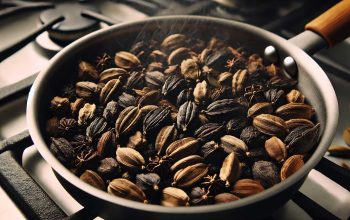In the world of spices, black cumin stands out. It’s a versatile treasure with ancient roots. Known as Nigella sativa, this seed is loved for its unique taste and health benefits. It shines in cooking and natural remedies.
Coming from the Mediterranean and the Middle East, black cumin has a long history in healing. It has been part of many cultures, from ancient Egypt to the Islamic world. Today, it’s still fascinating to researchers and health fans, who discover its many benefits.
Key Takeaways
- Black cumin, also known as Nigella sativa, is a versatile spice with a rich history as both a culinary ingredient and a traditional remedy.
- Originating from the Mediterranean region and the Middle East, black cumin has been revered for its unique flavor profile and remarkable medicinal properties.
- The spice has been woven into the cultural and spiritual practices of various ancient civilizations, including the Egyptians and the Islamic world.
- Modern researchers and health enthusiasts are increasingly exploring the wealth of benefits hidden within black cumin seeds.
- This introduction sets the stage for a deeper dive into the fascinating world of black cumin, exploring its botanical classification, traditional uses, and the latest scientific findings on its therapeutic potential.
Understanding Black Cumin: Nature’s Ancient Treasure
The story of nigella sativa, also known as black seed, kalonji, or habbat al-barakah, is fascinating. It shows the lasting power of nature’s ancient remedies. This seed has been a key part of traditional medicine for thousands of years, across many cultures.
The Historical Journey of Nigella Sativa
Nigella sativa comes from the Mediterranean. It has a long history, with use dating back to ancient times. It was valued for its health benefits and cooking uses, from ancient Egypt to the writings of the Prophet Muhammad.
Traditional Names Across Cultures
- Nigella sativa: The botanical name for this versatile plant.
- Black seed: A common English term for the tiny, black seeds.
- Kalonji: The Hindi and Urdu name for nigella sativa.
- Habbat al-barakah: The Arabic name, meaning “the blessed seed.”
Botanical Classification and Plant Features
Nigella sativa is in the Ranunculaceae family, a group of flowering plants. It’s an annual herb with delicate leaves and pale blue or white flowers. Its most notable feature is the small, black seeds that make it famous.
“Black seed is the remedy for every disease except death.” – Prophet Muhammad
The Sacred Connection: Black Seed in Religious Texts
The prophet’s herb, also known as habbatul barakah, is highly valued in many religions. It’s seen as a spiritual treasure and a healing plant. In Islam, it’s known for treating many illnesses, making it a key part of the faith’s history and medicine.
The Qur’an talks about the prophet’s herb in a special verse. It says: “And [mention, O Muhammad], when We gave Moses the Scripture [i.e., the Torah] and criterion that perhaps you [believers] might be guided. And [mention, O Muhammad], the Day when He will call you and you will respond with [words of] praise and believe in Me as you did not used to. Then He will inform you of what you used to do.” (Quran 27:2-3).
“Truly in the prophet’s herb is a cure for all diseases, except death.” – Hadith of the Prophet Muhammad (peace be upon him)
This saying from the Prophet Muhammad shows how much the prophet’s herb is respected. It’s believed to have amazing healing powers. This has inspired many Muslims to use it in their lives, seeking its many benefits.
The prophet’s herb is also important in other cultures. In ancient Egypt, it was used for medicine and in religious rituals. In Ayurvedic medicine, it’s called kalonji and is valued for its healing properties.
The prophet’s herb connects many religions, showing its deep spiritual and healing value. As science learns more about it, the prophet’s herb proves the wisdom and healing in nature.
Essential Compounds: What Makes Black Cumin Powerful
Black cumin, also known as Nigella sativa, is famous for its health benefits. Its unique chemical makeup is key. At the center of this is a compound called thymoquinone.
Thymoquinone: The Active Component
Thymoquinone is the main active part in black seed oil, making up to 30% of it. This antioxidant is studied for many health benefits. It fights inflammation, boosts the immune system, and may fight cancer.
Beneficial Fatty Acids Profile
- Black cumin seed oil is full of unsaturated fatty acids like linoleic acid and oleic acid. These are good for the heart.
- The oil also has essential fatty acids like omega-3 and omega-6. These are important for our health.
Mineral and Vitamin Content
Black cumin is also packed with vitamins and minerals. It has vitamins A, B, and C, and minerals like calcium, iron, and copper. These help our body in many ways, like boosting the immune system and keeping skin and hair healthy.
The mix of thymoquinone, fatty acids, and vitamins and minerals makes black cumin special. It’s valued for improving health and well-being.
Black Cumin’s Journey from Ancient Egypt to Modern Medicine
Black cumin, known scientifically as Nigella sativa, has a long and interesting history. It has been used for its health benefits for thousands of years. The ancient Egyptians were among the first to value it for its medicinal properties.
In ancient Egypt, black cumin was highly prized. Archaeologists have found jars of black cumin seeds in some tombs. The Egyptians used it in their holistic healthcare practices.
- They believed black cumin could improve overall health and treat many ailments, like respiratory and digestive issues.
- They also thought it had protective and purifying qualities, making it important in religious and spiritual rituals.
Over time, black cumin’s reputation as a natural remedy grew. It became part of traditional medicine in many cultures. From the Middle East to India, its unique properties were celebrated.
“Black cumin is a blessed seed that holds healing for every disease except death.”
– Prophet Muhammad
In recent years, scientists have studied black cumin’s benefits. They’ve looked into its uses for respiratory health and immune system support. The active compounds in black cumin, like thymoquinone, have been researched a lot.
Today, black cumin is being used in modern healthcare. It connects traditional wisdom with modern medicine. Its journey from ancient Egypt to today’s research labs shows the power of nature’s natural remedies.
Therapeutic Applications of Black Seed Oil
Black seed oil, also known as Nigella sativa oil, has been used for centuries. It’s known for its healing properties. Research shows it may help with respiratory health, digestive issues, and boost the immune system.
Respiratory Health Benefits
Studies have looked into black seed oil’s effects on breathing. It may ease symptoms of asthma and chronic obstructive pulmonary disease (COPD). It could also improve lung function and reduce the need for medicines.
Digestive System Support
Black seed oil may also help with digestion. Its anti-inflammatory and antimicrobial effects could soothe stomach problems like irritable bowel syndrome (IBS) and ulcerative colitis. It has a compound called thymoquinone that protects the stomach.
Immune System Enhancement
Many studies have looked into black seed oil’s impact on the immune system. Its antioxidant and anti-inflammatory properties may boost the immune system. It could help fight infections and support immune function.
Before using black seed oil, talk to a healthcare professional. Knowing its benefits can help you use it wisely in your health routine.
Culinary Uses and Flavor Profile
The cumin noir, also known as black cumin or fennel flower, is loved worldwide. Its unique smell and taste have made it a favorite in many dishes. It’s especially valued in the Middle East, South Asia, and other places.
In Middle Eastern cooking, cumin noir is essential. It adds a rich flavor to foods like hummus, falafel, and shawarma. Its taste, which is a bit nutty and warm, goes well with other spices and herbs.
- In India, cumin noir is key in curries, dals, and biryanis. It brings a deep flavor and balances the spiciness of chilies.
- In North Africa, it’s used in tagines and harissa. It adds a special aroma to these dishes.
Cumin noir is not just for savory dishes. It also makes sweet treats better. It goes well with honey, citrus, and chocolate, making it great for baked goods, desserts, and drinks.
“Black cumin’s complex flavor profile, with notes of pepper, anise, and even a hint of eucalyptus, makes it a captivating spice to experiment with in the kitchen.”
Cumin noir can be used in many ways. It can be whole, ground, or mixed into oils and vinegars. It makes simple meals and fancy dishes taste better. Its unique taste and long history make it a must-have for anyone who loves cooking.
Growing and Harvesting Black Cumin
Cultivating black cumin, also known as Nigella sativa, is a delicate yet rewarding process. It has been practiced for centuries around the world. From the Middle East’s deserts to India’s lush hills, this herb grows well in certain conditions. It offers a rich harvest of flavorful and versatile seeds.
Optimal Growing Conditions
Black cumin plants do best in warm, semi-arid climates. They need well-draining, nutrient-rich soil. The best temperature for black cumin cultivation is between 59°F to 86°F (15°C to 30°C). They also need moderate rainfall during the growing season.
The plant can grow in various soils but loves loamy, slightly alkaline ones. The pH should be between 6.0 and 8.0.
Harvesting and Processing Methods
The tradition of nigella sativa farming ends with careful harvesting and processing. As the plant matures, the seed pods turn brown. This is the best time to harvest.
The pods are picked by hand or mechanically. Then, they are dried in the sun or with gentle heat. This preserves their flavor and aroma.
- Gentle threshing separates the seeds from the pods, followed by thorough cleaning to remove any impurities.
- The seeds are then stored in a cool, dry place, ensuring their potent medicinal and culinary properties are maintained for later use.
By mastering black cumin cultivation and processing, growers can produce this ancient spice. They deliver its unique benefits to people all over the world.
Black Seed Oil Production Methods
Getting black seed oil from the Nigella sativa plant needs special techniques. Two main methods are cold-pressing and solvent extraction.
Cold-pressing: Preserving the Essence
Cold-pressing is a soft way to get the oil. It doesn’t use heat or chemicals. This keeps the oil’s good stuff, like smell and taste, intact.
The oil from cold-pressing is often seen as the best. It’s pure and strong because it’s not changed much.
Solvent Extraction: Maximizing Yield
Solvent extraction uses chemicals like hexane or ethanol. It gets more oil from the seeds. But, it might lose some of the oil’s fine details.
This could make the oil less good in quality and mix.
| Extraction Method | Oil Quality | Yield Quantity |
|---|---|---|
| Cold-pressing | High | Moderate |
| Solvent Extraction | Moderate | High |
Choosing between cold-pressing and solvent extraction depends on what you need. If you want the best oil, cold-pressing is better. But, if you need lots of oil, solvent extraction might be the way to go.

How the oil is made affects its health benefits and taste. Knowing how it’s made helps you pick the right black seed oil for you.
Modern Research and Scientific Evidence
Black cumin, or Nigella sativa, has seen a lot of scientific study lately. These studies have looked into its health benefits. They show it could be a natural cure for many conditions.
Clinical Studies Overview
Many studies have looked at black cumin’s effects on breathing. The results are encouraging. It might help with asthma and improve lung health.
It also seems to have anti-inflammatory properties. This could make it a natural treatment for breathing problems.
In the area of digestion, black cumin research is promising. It shows the spice can help the stomach and intestines. It might ease ulcers, constipation, and irritable bowel syndrome.
Current Research Developments
New scientific studies are looking into black cumin’s uses. They think it could boost the immune system. This could help fight off infections and illnesses.
There’s also interest in black cumin for cancer research. Early studies suggest it might have anti-cancer properties. It could be used alongside traditional treatments.
The scientific community is excited about black cumin research. It seems like a powerful natural remedy. With more studies, black cumin’s role in modern medicine is looking up.
Natural Remedies Using Black Cumin
Black cumin, also known as Nigella sativa, has been used for centuries. It’s known for its healing properties. This spice is used in traditional medicine worldwide. Today, it’s popular among those looking for natural remedies.
Black cumin is famous for treating respiratory issues. You can make a tea from crushed seeds to ease coughs and colds. It also helps with asthma. The compound thymoquinone in black cumin has anti-inflammatory and decongestant effects.
- Black cumin seed oil can be applied topically to soothe skin conditions such as eczema, psoriasis, and acne.
- Black cumin can be incorporated into homemade salves and balms to promote wound healing and reduce inflammation.
- A mixture of black cumin, honey, and lemon can be consumed as a natural cough suppressant and immune booster.
| Traditional Remedy | Ingredients | Potential Benefits |
|---|---|---|
| Respiratory Tonic Tea | Crushed black cumin seeds, honey, lemon | Alleviate coughs, colds, and asthma symptoms |
| Skin Soothing Balm | Black cumin seed oil, beeswax, shea butter | Reduce inflammation and promote healing in skin conditions |
| Immune-Boosting Elixir | Black cumin, honey, lemon | Enhance immune function and suppress cough |
Before using black cumin, talk to a healthcare professional. This is especially true if you have health conditions or take medications. By learning about black cumin’s healing properties, you can explore natural remedies and enjoy its benefits.
Selecting and Storing Black Cumin Products
To get the most out of black cumin, choose top-notch products and store them right. Black cumin seeds and oil are loved for their great taste and health benefits. But, their quality can differ a lot. Knowing what makes them great and how to store them well keeps your black cumin fresh and potent.
Quality Indicators
To find the best black cumin, look for these signs:
- Whole, unbroken seeds with a deep, lustrous black color
- Seeds that are free of debris, dust, or discoloration
- A pungent, earthy aroma with subtle notes of mint or pepper
- For black cumin oil, a rich, golden-brown hue and a smooth, consistent texture
Storage Best Practices
Keeping your black cumin in the right place is crucial. Here are some tips for storage methods:
- Store whole black cumin seeds in an airtight container, away from direct light and heat.
- For black cumin oil, keep the bottle tightly sealed and refrigerate to preserve the delicate nutrients and flavors.
- Avoid exposing black cumin to moisture, as this can lead to spoilage and the growth of mold.
- Check expiration dates and use black cumin products within their recommended timeframe for maximum freshness and potency.
By picking high-quality black cumin and storing it correctly, you’ll enjoy all its benefits.
Safety Considerations and Potential Interactions
Black cumin, also known as Nigella sativa, is usually safe to eat. But, it’s key to know about possible safety issues and drug interactions. Always talk to a healthcare professional before adding black cumin to your routine. This is especially true if you have health problems or take prescription drugs.
One big safety worry with black cumin is how it might affect certain medicines. Black cumin safety is very important because it could mess with blood-thinning drugs, diabetes meds, and some cancer treatments. It’s vital to check with your doctor to make sure black cumin won’t clash with your meds.
Also, drug interactions with black cumin can happen, especially with liver-processed drugs. Black cumin has compounds that can change how the liver works. This might affect how your body processes drugs. So, it’s important to talk openly with your healthcare provider about using black cumin supplements.
Black cumin might also cause mild side effects like heartburn, nausea, or stomach upset. These side effects are usually mild and go away with time or by adjusting the dose. But, if you have any bad reactions, stop using it and talk to your doctor.

To use black cumin safely, start with small amounts and slowly increase as you can. It’s also important to buy high-quality, trusted black cumin products from good sources. By being careful with black cumin safety and drug interactions, you can enjoy its benefits while keeping your health first.
Black Cumin in Global Cuisine
Kalonji, also known as roman coriander, is a key ingredient in many cuisines worldwide. It adds depth and complexity to dishes. This ancient seed is loved for its unique flavor in the Middle East and India.
Middle Eastern Recipes
In the Middle East, kalonji is a favorite. It’s used in mamnous, a savory Iranian pastry. The seeds are sprinkled over layers of dough and cheese.
In shai markaz, a Jordanian tea, kalonji seeds are steeped with spices. This creates a soothing and aromatic drink.
Indian Culinary Applications
In India, kalonji is highly valued. It’s used in nihari, a slow-cooked meat stew. The seeds add flavor and warmth.
In chole masala from Punjab, kalonji is toasted and ground. It enhances the dish’s aroma and taste.
| Dish | Region | Role of Kalonji |
|---|---|---|
| Mamnous | Iran | Sprinkled over layers of flaky dough and cheese |
| Shai Markaz | Jordan | Steeped alongside fragrant spices in traditional tea |
| Nihari | Northern India | Adds depth of flavor and subtle warming sensation to slow-cooked meat stew |
| Chole Masala | Punjab, India | Toasted and ground into the spice blend, contributing to aroma and taste |
Kalonji, or roman coriander, is a key ingredient in many cuisines. It brings unique flavors to dishes in the Middle East and India. Its versatility and appeal are unmatched.
Sustainable Farming and Production
The world’s love for black cumin is growing fast. This means we need to farm it in a way that’s good for the planet. Farmers are now using green methods to grow sustainable black cumin. This way, we get to enjoy the spice while keeping our planet healthy.
At the core of black cumin farming is a deep respect for the earth. Farmers are using new ways to lessen harm to the environment. They’re doing things like:
- Organic pest management to cut down on synthetic pesticides
- Water-saving methods to use less and waste less
- Crop rotation and intercropping to keep the soil healthy
- Using renewable energy to power their farms
These methods protect our ecosystems and help grow sustainable black cumin without harmful chemicals. By choosing sustainable farming, we make sure this amazing spice is here for the future.
| Sustainable Farming Practices | Benefits |
|---|---|
| Organic pest management | Less use of synthetic pesticides, better for the earth and us |
| Water conservation strategies | Using water wisely, saving it for the future |
| Crop rotation and intercropping | Keeping the soil healthy without synthetic fertilizers |
| Renewable energy sources | Powering farms in a way that’s kind to the planet |
More and more people want to buy sustainable black cumin. By farming responsibly, farmers help keep this valuable crop safe. They’re also helping make our food system better for everyone.
The Future of Black Cumin Research
The world of black cumin studies is growing, showing great promise for its use in medicine. Scientists are studying the complex compounds in black cumin. They aim to unlock its full potential.
Thymoquinone, a key compound in black cumin, is being looked at for treating many health issues. Clinical trials are underway to see if it helps with breathing problems, metabolic disorders, and some cancers.
| Potential Medical Applications | Current Research Focus |
|---|---|
| Respiratory Health | Exploring the anti-inflammatory and bronchodilatory effects of black cumin in managing conditions like asthma and COPD. |
| Metabolic Disorders | Investigating the impact of black cumin on insulin sensitivity, lipid profiles, and weight management. |
| Cancer Treatment | Studying the potential of black cumin’s compounds in inhibiting tumor growth and enhancing the efficacy of conventional cancer therapies. |
Researchers are also looking into black cumin’s role in nutrition. They’re studying how it can be used as a functional food. This could help support overall health and reduce the risk of chronic diseases.
The future of black cumin studies looks very promising. It could change healthcare and wellness in big ways.
Black Cumin’s Role in Holistic Wellness
Black cumin is a key player in holistic wellness. It has a rich history and many health benefits. This ancient seed is known for its healing properties and is now popular in natural health practices.
It helps support balance and vitality. The holistic approach sees the mind, body, and spirit as connected. Black cumin fits perfectly into this view, helping with many health issues.
It’s used for breathing problems, digestion, and boosting the immune system. Its unique compounds, like thymoquinone, have caught the interest of researchers and health fans.
Black cumin is becoming more important in holistic health. Adding it to wellness plans can bring many benefits. It helps promote well-being and supports a natural lifestyle.



